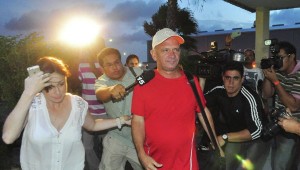by Philippa Webb
A recent legal flurry on the island of Aruba (population: 100,000) has raised interesting questions about the nature and scope of diplomatic/consular immunity.
Hugo Carvajal, the former chief of Venezuelan military intelligence and retired General whose nickname is ‘el Pollo’ (the Chicken), was detained in Aruba on 23 July. He had been admitted to the island on a diplomatic passport and had been named Consul-General to Aruba by Venezuela earlier in the year.
According to news reports, he was detained at Aruba’s international airport pursuant to a request from the United States. He is accused of conspiring with Colombian drug traffickers to export cocaine to the US. In 2008, the US Treasury Department put him on a blacklist, alleging he had protected drug shipments from FARC and provided them with weapons and logistical assistance.
Venezuela’s Ministry for Foreign Affairs rejected the ‘illegal and arbitrary detention of [a] Venezuelan diplomat’ and invoked the 1961 Vienna Convention on Diplomatic Relations. A local judge in Aruba, however, rejected the claim of diplomatic immunity on 25 July. The judge pointed out that Carvajal’s nomination of Consul General had not yet been accepted by the Dutch authorities, which was required since Aruba is part of the Kingdom of The Netherlands. The judge ordered Carvajal to be held pending extradition proceedings.
Two days later, on 27 July, the Minister of Foreign Affairs of The Netherlands found that Carvajal did enjoy diplomatic immunity and he was released and ordered to back to Venezuela having been declared persona non grata. He received a hero’s welcome.
This chain of events raises two questions. What type of immunity, if any, was Carvajal entitled to? Did his detention in Aruba violate that immunity?
Type of immunity?
If Carvajal had been appointed Consul-General to Aruba, then the relevant treaty is the Vienna Convention on Consular Relations 1963 (VCCR), not the Vienna Convention on Diplomatic Relations (VCDR) that was invoked by Venezuela.
Under the VCCR, the appointment of the head of the consular post requires the authorization of the receiving State, which the receiving State may refuse to give without having to provide reasons (Art12(1) and (2)). A Consul-General may not commence his duties until he receives authorization from the receiving State, save for two circumstances: provisional admission to the exercise of consular functions pending the delivery of the authorization in which case the provisions of the VCCR apply (Art 13) or if the person has to be acting head of the consular post because the head is unable to carry out his functions or the post is vacant (Art 15).
Based on press reports, it appears that Carvajal did not have the authorization of the Dutch Government and was not acting Consul-General, so the only way in which the VCCR could apply to him is on a provisional basis under Article 13 (and this appears to be the Dutch Ministry for Foreign Affairs’ position).
Interestingly, if Carvajal had been appointed a consular officer rather than the Consul-General, the authorization of the Dutch Government probably would not have been required. Article 19 of the VCCR allows the sending State to ‘freely appoint’ members of the consular staff, and authorization is only relevant if either the sending State or receiving State’s domestic laws require it.
Does it make a difference that Carvajal apparently travelled on a ‘diplomatic passport’? Diplomatic passports are issued to a wide range of people, including those who are not diplomats. The possession of such a passport may be an indication of immunity, but is not definitive in and of itself.
Violation of immunity?
Consular officers, including Consuls-General, possess more limited privileges and immunities than diplomatic agents. Article 43 VCCR provides that consular officers are immune from the jurisdiction of the receiving ‘in respect of acts performed on the exercise of consular functions’. This contrasts with the immunity of diplomats, which covers their private acts as well.
If Carvajal was found to have been provisionally acting as Consul General in Aruba, it is highly unlikely that he would be immune from the jurisdiction of the local courts since the allegations of drug-trafficking related to acts prior to any exercise of consular functions and can hardly be said to fall within those functions.
Despite this analysis, the outcome of this case was that the Dutch Ministry for Foreign Affairs endorsed Carvajal’s immunity and enabled his release. Diplomatic (and consular) relations are ultimately about more than the text of the 1961 and 1963 Conventions. They are a web of interlocking, bilateral and reciprocal arrangements, that are as influenced by politics as they are by law.
We should be wary of any attempt to treat this incident as State practice evidencing an extended understanding of the immunity enjoyed by (purported) consular officials. Other factors were in play.

